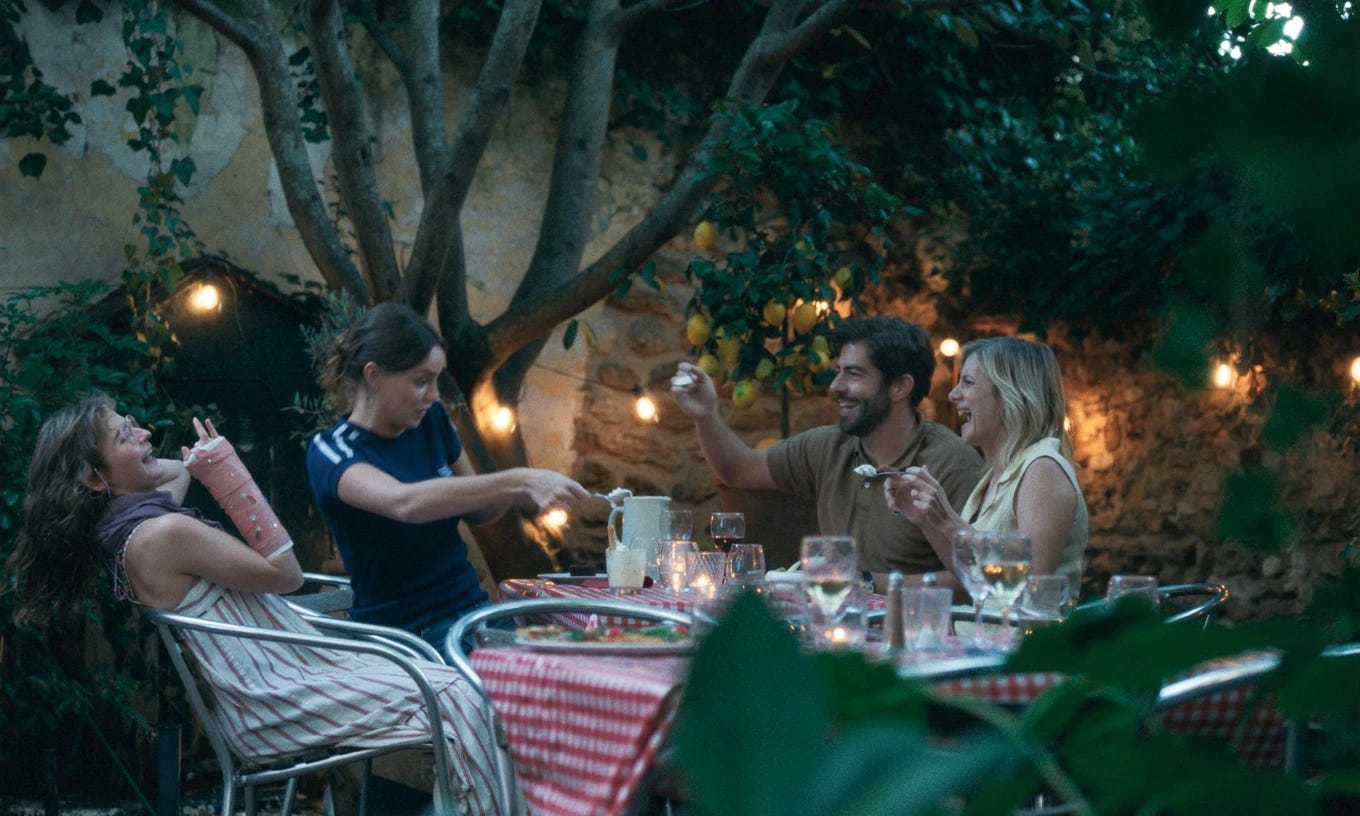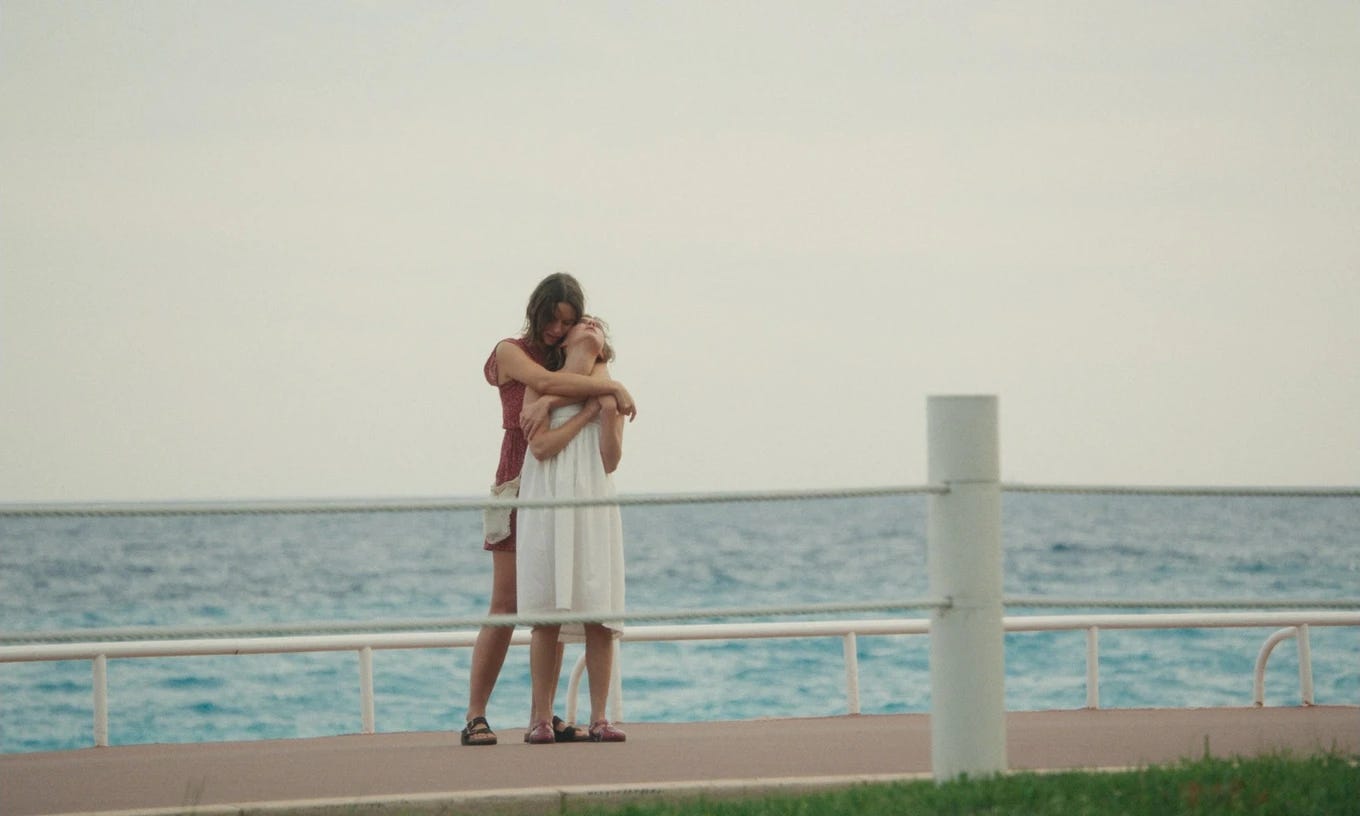Todo cinema se alimenta do artista, física, espiritual, emocional ou psicologicamente. Como alimento, nutre-o em retorno. O artista está na arte, e esta nele, em proporções das mais variadas: a preocupação temática, a assinatura estilística e até a vida pessoal. The Wonderers integra um conjunto de dramas que modelam, através da linguagem da ficção, uma vivência do artista, neste caso, da diretora e corroterista Joséphine Japy, e também a irmã de uma pessoa com a síndrome de Phelan-McDermid. É a premissa de um filme que explora uma família ficcional, mas com sentimentos reais, os Roussier: a mãe sobrecarregada, Madeleine (Mélanie Laurent), o pai ausente, Gilles (Pierre-Yves Cardinal), e as filhas, Marion (Angelina Woreth) e Bertille (Sarah Pachoud), já ilustrada a partir de um plano sensorial, enfatizando os olhos, a boca, ou a pele, e me remetendo a um divórcio formal do plano da realidade onde habitam os demais.
Em razão de seu estado de saúde, Bertille está isolada de uma vida tradicional, mesmo diante dos esforços possíveis da mãe e irmã para mitigar isso. A família isola-se junto; é até irônico que Marion estude sobre o isolacionismo dos países, dada a sua situação, atravessando a adolescência, e as suas etapas e experiências, de uma forma distinta da de seus amigos. Enquanto as mulheres da família orientam às suas vidas, em maior ou menor grau, em função de Bertille, o pai tem o ‘direito’ de ir e vir daquele mundo. Um aspecto que a direção de Japy não abona, nem condena, pois mesmo que a direção não se furte de sublinhar o ‘privilégio’ do homem no meio social e familiar, a narrativa não é sobre isto. Gilles não é mau, somente está em uma posição em que pode se afastar, e, assim, terceirizar às mulheres a tarefa historicamente atribuída de serem cuidadoras.
Eu até admiro a postura do pai no momento em que aconselha a filha a ‘priorizar-se’, mesmo que possa implicar em uma sobrecarga ainda maior sobre Madeleine. Porém, seu raciocínio está correto, e ouvi-lo falar isso é como se Japy dissesse para si mesma (uma vez que Marion é a sua substituta cinematográfica). É um ponto significativo ao debate e à reflexão, o momento em que o cuidado transforma-se em autossacrifício. E veja que estamos dentro de um contexto de uma família de classe média/alta, que tem os recursos financeiros suficientes para arcar com os gastos e investigações genéticas, obrigando-me a refletir a realidade de outras famílias que não compartilham a mesma condição. Não quero impor a Japy uma história que não seja a que tenha dentro de si, ainda que a narrativa tenha me convidado a esta reflexão.
Entretanto, a narrativa apresenta contradições irreconciliáveis: enquanto admiro que Bertille não seja instrumentalizada a serviço do clichê da pessoa com deficiência, que termina por unir a família, apenas existindo dentro daquele contexto com as dores, os dissabores ou as alegrias por ser quem é, a personagem é enfim instrumentalizada em um conflito artificial e que funciona só para proporcionar um desfecho na narrativa. E é frustrante porque o centro emocional estava bem delineado no relacionamento entre Marion e Bertille, em um gesto discreto de uma encostar a cabeça no ombro da irmã, a fim de revelar que, em que pese a maneira diferente de se relacionar com o mundo, ela sente e percebe o que importa.
Fora isso, há elementos que pintam a experiência adolescente, e podem até mesmo ser autobiográficos, de um jeito superficial: o relacionamento de Marion com um homem mais velho, com uma conclusão de que está procurando a figura paterna mais ausente em um romance que não a levará a lugar nenhum. Isso vale para os elementos formais e simbólicos, a exemplo da utilização de um limpador de para-brisa como o substituto imediato de lágrimas de Madeleine. Essa simplicidade, que não é uma mera singeleza, entra em contraste com uma notícia recebida de forma agridoce, a respeito da doença de Bertille. É uma emoção conflituosa: a alegria por um familiar amado ou o ‘fardo’ de persistir na missão de afeto, cuidado e, às vezes, sacrifício.
The Wonderers (Qui Brille Au Combat) está em exibição no Festival de Cannes de 2025.
English Review
All cinema feeds on the artist, physically, spiritually, emotionally or psychologically. Like food, it nourishes the artist in return. The artist is in the art, and is in it, in the most varied proportions: thematic concern, stylistic signature and even personal life. The Wonderers is part of a series of dramas that model, through the language of fiction, an experience of the artist, in this case, of the director and co-writer Joséphine Japy, and also of the sister of a person with Phelan-McDermid syndrome. This is the premise of a film that explores a fictional family with real feelings, the Roussiers: the overwhelmed mother, Madeleine (Mélanie Laurent), the absent father, Gilles (Pierre-Yves Cardinal), and the daughters, Marion (Angelina Woreth) and Bertille (Sarah Pachoud), illustrated from a sensorial perspective, emphasizing the eyes, the mouth, or the skin, and referring to a formal divorce from the plane of reality where the others live.
Due to her health condition, Bertille is isolated from a traditional life, despite the best efforts of her mother and sister to mitigate this. The family isolates itself together; it is even ironic that Marion studies the isolationism of countries, given her situation, going through adolescence, and its stages and experiences, in a different way from that of her friends. While the women in the family direct their lives, to a greater or lesser extent, according to Bertille, the father has the ‘right’ to come and go from that world. This is an aspect that Japy’s direction neither supports nor condemns, because even though the direction does not shy away from emphasizing the ‘privilege’ of men in the social and family environment, the narrative is not about this. Gilles is not bad, he is simply in a position where he can withdraw, and thus outsource to women the historically assigned task of being caregivers.
I even admire the father’s stance when he advises his daughter to ‘prioritize herself’, even if it may imply an even greater burden on Madeleine. However, his reasoning is correct, and hearing him say this is as if Japy were saying it to herself (since Marion is her cinematic surrogate). It is a significant point for debate and reflection, the moment when care becomes self-sacrifice. And note that we are within the context of a middle/upper class family, which has enough financial resources to cover the expenses and genetic investigations, forcing me to reflect on the reality of other families that do not share the same condition. I do not want to impose on Japy a story that is not the one she has inside herself, even though the narrative has invited me to this reflection.
However, the narrative presents irreconcilable contradictions: while I admire that Bertille is not instrumentalized in the service of the cliché of the person with a disability, who ends up uniting the family, only existing within that context with the pain, the disappointments or the joys of being who she is, the character is ultimately instrumentalized in an artificial conflict that only works to provide an ending to the narrative. And it is frustrating because the emotional center was well outlined in the relationship between Marion and Bertille, in a discreet gesture of one resting her head on her sister's shoulder, in order to reveal that, despite the different way of relating to the world, she feels and perceives what matters.
Apart from that, there are elements that paint the adolescent experience, and may even be autobiographical, in a superficial way: Marion's relationship with an older man, with a conclusion that she is looking for the most absent father figure in a romance that will lead her nowhere. This applies to the formal and symbolic elements, such as the use of a windshield wiper as an immediate substitute for Madeleine's tears. This simplicity, which is not mere simplicity, contrasts with the bittersweet news received about Bertille's illness. It is a conflicting emotion: the joy for a beloved family member or the 'burden' of persisting in the mission of affection, care and, at times, sacrifice.






